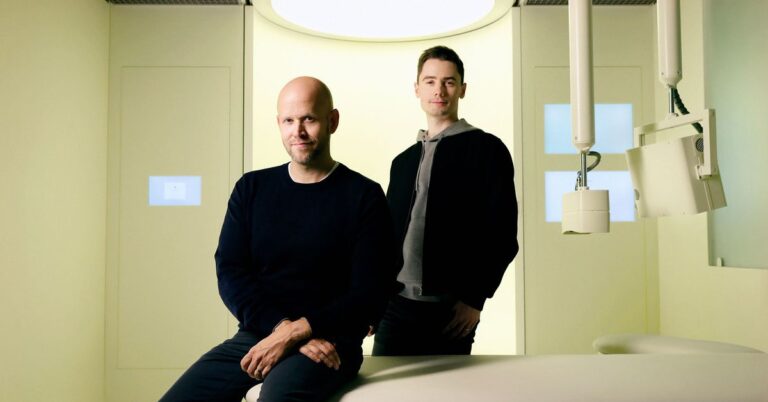
[ad_1]
“After four years of intense research and product development, we are officially launching Neko Health today,” the post reads. “The company was founded by Hjalmar Nilsonne and Daniel Ek with the vision to create a healthcare system that can help people stay healthy through preventive measures and early detection.”
According to a translated version of Neko Health’s website, the Swedish company’s non-invasive full-body scanner can detect and measure the growth of birthmarks, rashes, and age spots. It also utilizes a separate scanner to pick up on any abnormalities in heart function, blood pressure, and pulse throughout the body.
Neko says the company’s 360-degree body scanner comes equipped with over 70 sensors that collect more than “50 million data points on skin, heart, vessels, respiration, microcirculation and more.” This data is then analyzed by a “self-learning AI-powered system” that spells out the results for doctors and patients. Clients get results at their appointment, and can even view and track their results on an accompanying app.
“Our mission is to build a proactive healthcare system, one that is focused on preventing diseases,” Nilsonne writes in a post on LinkedIn, citing the rising costs of healthcare in Sweden and the European Union. The full-body scans, which Neko says only take a few minutes, are currently open to the public in Sweden and cost 2,000 SEK (or around $190 USD). At this time of writing, the scans are currently sold out.
Ek’s foray into the healthcare industry isn’t exactly a surprise. Rumors about the startup have been circulating since November, and Ek has long hinted at getting involved in healthcare. In 2013, a report from The Financial Times revealed that Ek “spends spare hours thinking about how to fix a ‘screwed-up’ healthcare system.” “I’m not the inventor, but I may be the person that’s dumb enough to go against the system and try to beat it on its own terms,” he said at the time.
It’s obviously too early to tell what kind of impact Neko Health could have on the healthcare industry, but it sounds promising. Similar technology has emerged in the past, with Facebook and New York University teaming up to make MRI scans faster using AI, and researchers developing AI technology that scans your retina and predicts your risk of heart disease. But Neko Health employs this technology on a larger and more accessible scale, and it’s exciting to think about its potential.
[ad_2]